RESEARCH & SCIENCE
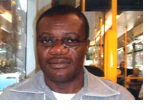 NIGERIA
NIGERIAFrom war in Biafra to the conflict in the Niger Delta
Professor Edlyne Anugwom of the Department of Anthropology and African Studies at Johannes Gutenberg University Mainz (JGU) is working on a project entitled "From Biafra to the Niger Delta Conflict: Memory, Ethnicity, and the State in Nigeria". We asked him to talk about his country, which is suffering not just from the current conflict but also, it seems, from denial of the past as well.
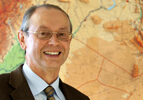 SYRIA
SYRIA"I have never experienced such a mode of disinformation before"
Günter Meyer is a popular interview partner when the crisis in Syria is the subject. Media representatives arrive in droves to talk with the professor, who works at the Institute of Geography at Johannes Gutenberg University Mainz (JGU). The expert on the Middle East is trying to correct the picture being propagated by mainstream journalism with its excessive bias in favor of the opposition.
 SURVEY
SURVEYGermans spend EUR 103 billion on sport
Sport is dear to German hearts, but before Holger Preuß conducted his study nobody had any idea just how dear it is. The professor of Sports Sociology and Sports Business Administration at Johannes Gutenberg University Mainz (JGU) presents figures that provide impressive proof of the economic impact of sport: Germans spend at least EUR 103 billion on sport every year.
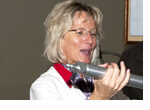 FUKUSHIMA
FUKUSHIMAThe media fueled fears while experts went unheard
What happened a year ago in Fukushima? What role did the media play concerning safety assessment? What are the risks of nuclear power? Dr. Gabriele Hampel, operating manager of the research reactor TRIGA of the Institute of Nuclear Chemistry at JGU, advocates an objective discussion about questions such as these. She sees the symposium "Radiation Protection - A Year after Fukushima" as a step in the right direction.
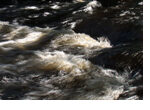 VIDEO INSTALLATION
VIDEO INSTALLATIONSix years of filming on the river
The video installation 'fliozan' invites visitors to lose themselves in the fascinating network of German riverscapes. It took six years for Professor Dr. Harald Schleicher of the Academy of Fine Arts at Johannes Gutenberg University Mainz (JGU) to complete this monumental project. It is now on display in Duisburg.
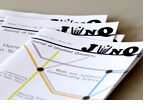 JOURNAL OF UNSOLVED QUESTIONS
JOURNAL OF UNSOLVED QUESTIONSFailures fuel science
Leonie Mück and Thomas Jagau found they were meeting a previously unexpected need when they started their "Journal of Unsolved Questions" in 2011. The two doctoral candidates at Johannes Gutenberg University Mainz (JGU) were surprised by the positive response that their journal elicited from all sides. Even though the interest in the publication is still considerable, the future of their "Journal of Unsolved Questions" remains uncertain.
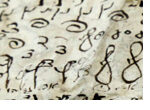 GENIZA PROJECT WEISENAU
GENIZA PROJECT WEISENAUA treasure chest of everyday Jewish life in the 18th century
The geniza of the old synagogue in Weisenau provides an in-depth look at the culture and everyday life of this old Jewish community. Professor Dr. Andreas Lehnardt of the Faculty of Protestant Theology at Johannes Gutenberg University Mainz (JGU) has spent the last two and a half years carefully combing through this legacy from the 18th and 19th centuries. In the process, some very unique items have been discovered.
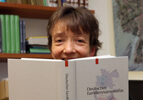 HISTORICAL LINGUISTICS
HISTORICAL LINGUISTICSThe landscape of surnames
As Professor of Historical Linguistics at Johannes Gutenberg University Mainz (JGU), Damaris Nübling's special interest is the development of the German language from its first documented form as Old High German, dating to around 800 AD, to contemporary German. Her current projects are witness to the fact that historical linguistics is actually anything but a drab and dry-as-dust discipline. Currently she is investigating the morphology of surnames in Germany.
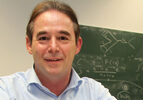 PARTICLE PHYSICS
PARTICLE PHYSICSHiggs boson electrifies Mainz physicists
Matthias Neubert and his team are elated since scientists at Geneva's CERN research center found the first indications of the existence of the Higgs boson. This is the last building block missing from the standard model of physics. The head of the Theoretical Elementary Particle Physics unit at Johannes Gutenberg University Mainz (JGU) now expects his area of research to take off.
